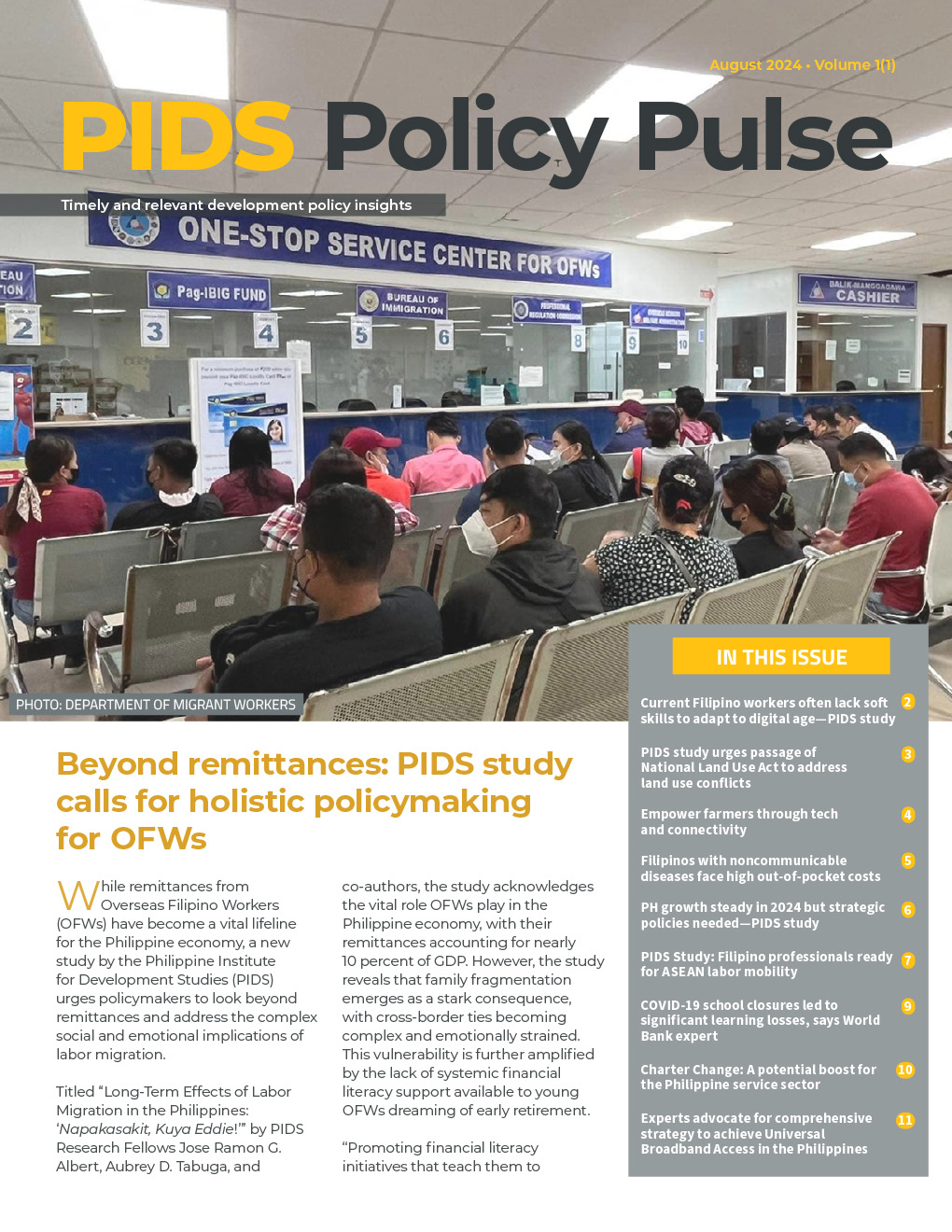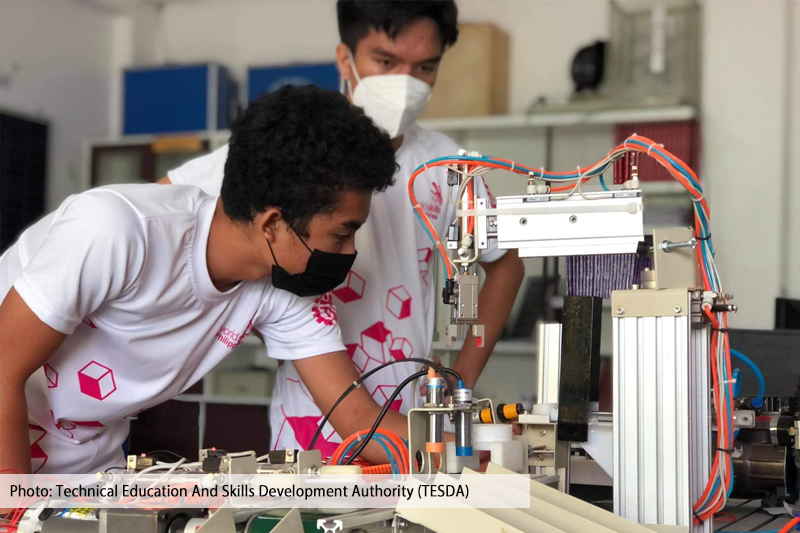The Duterte administration should allow businesses more flexibility when it comes to their manpower requirements, taking into account the nuances of certain industries, the Philippine Chamber of Commerce and Industry (PCCI) said on Monday.
The PCCI made this pronouncement after President Duterte again warned that he will shut down businesses if they will continue to practice contractualization, or “endo.”
PCCI President George T. Barcelon said they are willing to dialogue with the Department of Labor and Employment (DOLE), but the government should avoid blanket policies related to “endo.”
“Remember that there is really cyclical employment in some industries. [Ending contractualization] can’t apply to all sectors,” Barcelon said.
“[My business before], for example, has to hire more employees toward the end of the year, as we have to deliver goods to North America by summer the following year. But business slows by the first or second quarter,” he added.
While seasonal employment is different from “endo,” or the practice of giving a worker a five-month contract, Barcelon said the government’s policies on this should be “clear.”
He warned that the growth of micro, small and medium enterprises, which usually resort to hiring workers on a short-term basis, could be hampered if the government would be “too stringent” on its labor policies.
Barcelon said the government and the private sector should “work closely” to ensure that the Duterte administration’s labor policies would not lead to the loss of jobs. “Contractualization is not just a practice in the private sector. That’s done by the government, as well, so we’d like to coordinate and have a dialogue with the Dole,” he said.
Dr. Aniceto C. Orbeta Jr., research fellow of the Philippine Institute for Development Studies, said contractualization “is not that simple.” Orbeta said the government must carefully study the reasons why firms resort to contractualization.
These reasons are varied, such as the nature of their business or the level of trust accorded to employees.
He said some businesses, such as construction firms, would often veer away from hiring long-term employees because they are engaged in seasonal work, adding that buildings “do not take forever to construct.”
“For some jobs, it requires firms to know the workers before they will commit to them. You don’t want to trust your whole household to someone who is not trustworthy. It requires as much trust or as much skill. We don’t presume to know [all the reasons],” Orbeta said.
Since companies do not really declare their hiring strategies, Orbeta said the government may find it hard to pinpoint which businesses actually resort to contractualization.
What is needed, he said, is to give firms and employees “flexibilities.”
“If you ban contractualization, what happens to those jobs? How can you operate? Forcing companies to hire permanent employees right away may be too expensive for them,” Orbeta said.
‘Toothless’ memo
Last week, Labor Secretary Silvestre H. Bello III issued a memorandum reiterating the prohibition against labor-only contracting.
However, Bello’s Labor Advisory 10 merely reiterated the current laws, which on paper prohibit labor-only contracting, but in practice still allows some employers to skirt the constitutional right of workers to security of tenure.
This is because under the current laws against labor-only contracting, a contractor or subcontractor may still engage workers who will work for another corporation for as long as the contractor or subcontractor would have the minimum P3 million in substantial capital or investment in the form of tools, machineries, work premises and other assets.
The workers may attain regular status with respect to the contractor or subcontractor only, but not with respect to the corporation where they are actually performing the work.
Repeal or amend
According to the acting dean of the University of the Philippines’s School of Labor and Industrial Relations, the current laws still allow for contractualization of workers by providing for a process by which contractors or subcontractors may provide workers to another entity without being held liable for labor-only contracting.
Prof. Ma. Catalina M. Tolentino said unless Department Order 18-A is repealed or amended to disallow the arrangement wherein there is a middleman between the worker and a company, contractualization cannot be eradicated.
In effect, allowing contractors and subcontractors to operate still defeats the rationale of the laws to provide for a right of security of tenure of workers with respect to the corporation where they are actually rendering the service, and not merely with respect to the contractors or subcontractors.
Thus, only the blatant violations of the labor laws are actually punished by the government, such as the so-called “5-5-5” arrangements wherein the same workers are hired in cycles of five-month fixed-term employment periods which are particularly designed to prevent them from attaining regular status.
Workers elated
According to the Workers Assistance Center Inc. (WAC), a labor group supporting the establishment of a union in the Cavite-based C & F Manufacturing Philippines Corp., the threat from Mr. Duterte is a “welcome” development.
“This is welcome news and a great relief especially for agency-supplied contractual workers who’ve been working in a company for years already without being considered as a regular worker of a company,” WAC International Relations Officer Cecilia V. Tuico said.
“Thank God for our President who knows how to walk the talk. But more than closing down these companies and entities, we’re looking forward for the regularization of these affected workers in the companies where they are working for,” Tuico added.
WAC had brought to the DOLE’s attention the allegations of union busting by C& F Manufacturing, which remains pending at the department.
On Monday Mr. Duterte reiterated his policy against contractualization and warned corporations to follow the labor laws and not wait for any inspection which will only result in the closure of their factories.
“Don’t wait for me to find out, because I will be unforgiving. You will not only lose your money, you will lose your pants. I will have no tolerance for you on this. Stop that; pay them the correct salaries. Stop contractualization. It will not do good to our country,” Mr. Duterte said.
“If I find out, I will just simply close your plant and I can always find a thousand reasons to do it, believe me,” he added.
Mr. Duterte also reiterated his policy against illegal mining and warned mining companies not to use publicity against Environment Secretary Regina Paz L. Lopez to undermine her efforts against illegal mining operations.
He said the government could do away with the P40 billion in revenues, which they remit to the government.
“I can do away with the P40 billion. You obey or we will survive as a nation without you. You try to castigate Gina Lopez for being strict and yet, you destroy the land, destroy the soil, then you’re going to get rich out of it,” Mr. Duterte said.
“Those oligarchs who have foreign partners, you get rich at the expense of our native land. I will not allow it. I can forego the P40 billion I collect from you guys and the Filipinos will survive without you. Either you follow strictly government standards or you close up,” he added.
The PCCI made this pronouncement after President Duterte again warned that he will shut down businesses if they will continue to practice contractualization, or “endo.”
PCCI President George T. Barcelon said they are willing to dialogue with the Department of Labor and Employment (DOLE), but the government should avoid blanket policies related to “endo.”
“Remember that there is really cyclical employment in some industries. [Ending contractualization] can’t apply to all sectors,” Barcelon said.
“[My business before], for example, has to hire more employees toward the end of the year, as we have to deliver goods to North America by summer the following year. But business slows by the first or second quarter,” he added.
While seasonal employment is different from “endo,” or the practice of giving a worker a five-month contract, Barcelon said the government’s policies on this should be “clear.”
He warned that the growth of micro, small and medium enterprises, which usually resort to hiring workers on a short-term basis, could be hampered if the government would be “too stringent” on its labor policies.
Barcelon said the government and the private sector should “work closely” to ensure that the Duterte administration’s labor policies would not lead to the loss of jobs. “Contractualization is not just a practice in the private sector. That’s done by the government, as well, so we’d like to coordinate and have a dialogue with the Dole,” he said.
Dr. Aniceto C. Orbeta Jr., research fellow of the Philippine Institute for Development Studies, said contractualization “is not that simple.” Orbeta said the government must carefully study the reasons why firms resort to contractualization.
These reasons are varied, such as the nature of their business or the level of trust accorded to employees.
He said some businesses, such as construction firms, would often veer away from hiring long-term employees because they are engaged in seasonal work, adding that buildings “do not take forever to construct.”
“For some jobs, it requires firms to know the workers before they will commit to them. You don’t want to trust your whole household to someone who is not trustworthy. It requires as much trust or as much skill. We don’t presume to know [all the reasons],” Orbeta said.
Since companies do not really declare their hiring strategies, Orbeta said the government may find it hard to pinpoint which businesses actually resort to contractualization.
What is needed, he said, is to give firms and employees “flexibilities.”
“If you ban contractualization, what happens to those jobs? How can you operate? Forcing companies to hire permanent employees right away may be too expensive for them,” Orbeta said.
‘Toothless’ memo
Last week, Labor Secretary Silvestre H. Bello III issued a memorandum reiterating the prohibition against labor-only contracting.
However, Bello’s Labor Advisory 10 merely reiterated the current laws, which on paper prohibit labor-only contracting, but in practice still allows some employers to skirt the constitutional right of workers to security of tenure.
This is because under the current laws against labor-only contracting, a contractor or subcontractor may still engage workers who will work for another corporation for as long as the contractor or subcontractor would have the minimum P3 million in substantial capital or investment in the form of tools, machineries, work premises and other assets.
The workers may attain regular status with respect to the contractor or subcontractor only, but not with respect to the corporation where they are actually performing the work.
Repeal or amend
According to the acting dean of the University of the Philippines’s School of Labor and Industrial Relations, the current laws still allow for contractualization of workers by providing for a process by which contractors or subcontractors may provide workers to another entity without being held liable for labor-only contracting.
Prof. Ma. Catalina M. Tolentino said unless Department Order 18-A is repealed or amended to disallow the arrangement wherein there is a middleman between the worker and a company, contractualization cannot be eradicated.
In effect, allowing contractors and subcontractors to operate still defeats the rationale of the laws to provide for a right of security of tenure of workers with respect to the corporation where they are actually rendering the service, and not merely with respect to the contractors or subcontractors.
Thus, only the blatant violations of the labor laws are actually punished by the government, such as the so-called “5-5-5” arrangements wherein the same workers are hired in cycles of five-month fixed-term employment periods which are particularly designed to prevent them from attaining regular status.
Workers elated
According to the Workers Assistance Center Inc. (WAC), a labor group supporting the establishment of a union in the Cavite-based C & F Manufacturing Philippines Corp., the threat from Mr. Duterte is a “welcome” development.
“This is welcome news and a great relief especially for agency-supplied contractual workers who’ve been working in a company for years already without being considered as a regular worker of a company,” WAC International Relations Officer Cecilia V. Tuico said.
“Thank God for our President who knows how to walk the talk. But more than closing down these companies and entities, we’re looking forward for the regularization of these affected workers in the companies where they are working for,” Tuico added.
WAC had brought to the DOLE’s attention the allegations of union busting by C& F Manufacturing, which remains pending at the department.
On Monday Mr. Duterte reiterated his policy against contractualization and warned corporations to follow the labor laws and not wait for any inspection which will only result in the closure of their factories.
“Don’t wait for me to find out, because I will be unforgiving. You will not only lose your money, you will lose your pants. I will have no tolerance for you on this. Stop that; pay them the correct salaries. Stop contractualization. It will not do good to our country,” Mr. Duterte said.
“If I find out, I will just simply close your plant and I can always find a thousand reasons to do it, believe me,” he added.
Mr. Duterte also reiterated his policy against illegal mining and warned mining companies not to use publicity against Environment Secretary Regina Paz L. Lopez to undermine her efforts against illegal mining operations.
He said the government could do away with the P40 billion in revenues, which they remit to the government.
“I can do away with the P40 billion. You obey or we will survive as a nation without you. You try to castigate Gina Lopez for being strict and yet, you destroy the land, destroy the soil, then you’re going to get rich out of it,” Mr. Duterte said.
“Those oligarchs who have foreign partners, you get rich at the expense of our native land. I will not allow it. I can forego the P40 billion I collect from you guys and the Filipinos will survive without you. Either you follow strictly government standards or you close up,” he added.











